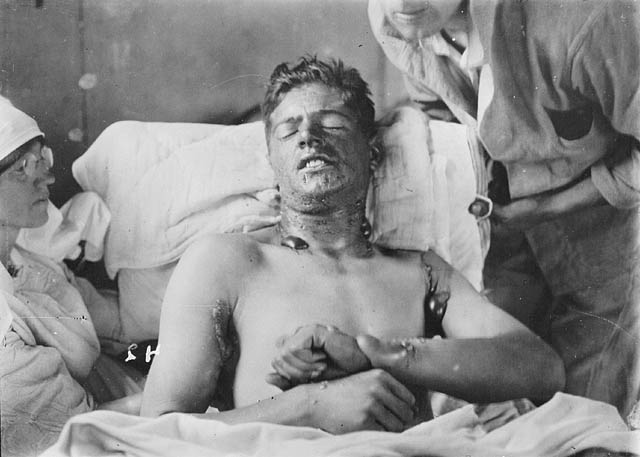Today, nearly one hundred years later, the chemical weapons from WW I are still with us. More than a billion various kinds of artillery shells were fired in the North and East of France. And one in four did not explode. So the large number of buried shells is a problem that has lasted for a century, and will continue to be for a century more longer. In France unexploded chemical shells are discovered nearly every day, and as they age and corrode, their contents can be released with deadly results.
Between 1945 and 2000, more than 660,000 bombs, 13.5 million and 24 million mines and various unexploded shells were found, neutralized and destroyed by members of France's intrepid bomb-disposal teams. 617 of them have been killed and thousands more injured in the removal of the shells in that time.
In this diary entry, Grant Willard describes one of his horrifying encounters with chemical warfare. This one just happened to be a case of friendly fire.
Summer has come in earnest. No more coats (if we can help it), and no more heavy underwear (if we could possibly get a hold of something light). France is perfectly glorious in such weather.
 We are still with the 26th doing the same work as before. Nothing much of excitement has happened since the Seicheprey experience. We have been putting in its work since we left the hospital. Kendrick still has a cough and his burns troubled him for a long time. Risley’s eyes have bothered him ever since. The sun hurts them. Gaynor’s throat still bothers him. A week after we were discharged from the hospital I took a bath. About an hour afterward I began breaking out in the most painful way. They said it was gas and gave me a solution of something to wash in. It helped some, but I am still pretty sore in some places.
We are still with the 26th doing the same work as before. Nothing much of excitement has happened since the Seicheprey experience. We have been putting in its work since we left the hospital. Kendrick still has a cough and his burns troubled him for a long time. Risley’s eyes have bothered him ever since. The sun hurts them. Gaynor’s throat still bothers him. A week after we were discharged from the hospital I took a bath. About an hour afterward I began breaking out in the most painful way. They said it was gas and gave me a solution of something to wash in. It helped some, but I am still pretty sore in some places.We were sent back on duty, after returning from Ménil-la-Tour two weeks ago, on May 9. Swain, Dunlap and I went to Commanderie and Hap and McCrackin went to Gironville[-sous-les-Côtés]. The first day was very quiet. We work on 48 hour shifts at these posts. At Commanderie we live in a two room abri doing our own cooking. We always have a good time up at these posts because there are no officers, except the French who are very nice with us, and we are our own bosses. The work is light as a rule; we make but two posts--Ranval and St. Agnant[-sous-les-Côtes] (the latter is supposed to be a night post, being within ½ km of the front line, but we have often made it in daytime).
On the 2nd night we were told to be ready for an attack in the St. Agnant sector. Maybe the Boche heard about it too, maybe it was accidental. The attack was set for 4 A.M. the following morning. The Boche sent over much gas at 2 A.M. with terrific results on the Americans. We were all called out at 3 A.M. and we kept very busy carrying gas patients all through the attack. The French made the attack, but the American boys suffered.
 |
| Canadian soldier with gas burns. |
One other gas attack, one turn at Gironville were all that happened after that. We had a pretty good rest in all. We swim in the Meuse now, walk into Commercy and around the surrounding country. The Lieutenant is feeling pretty good these days. He expects another ten days will find us in Nancy getting our cars painted the French grey ready to join a French division. Here’s hoping!
No comments:
Post a Comment